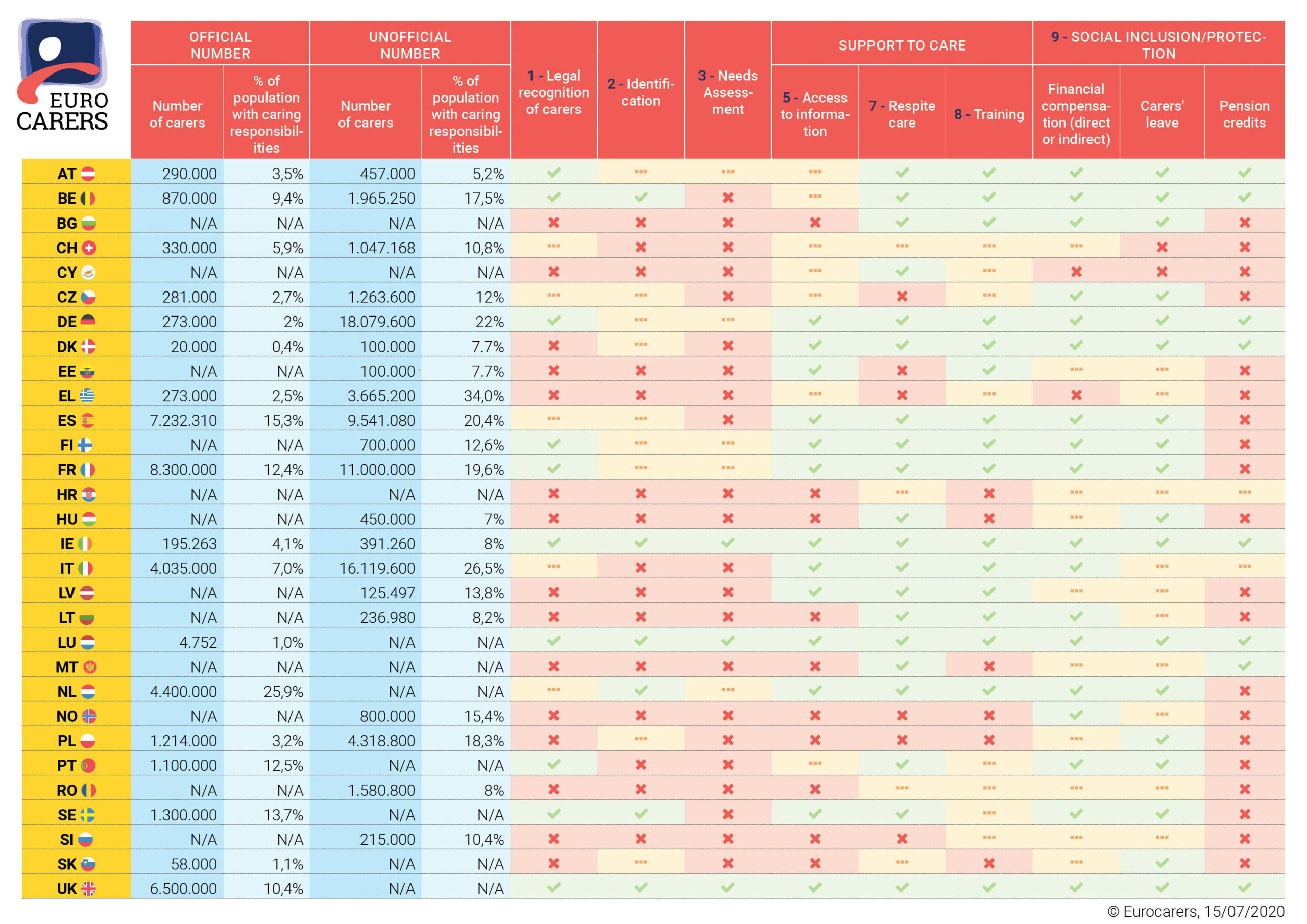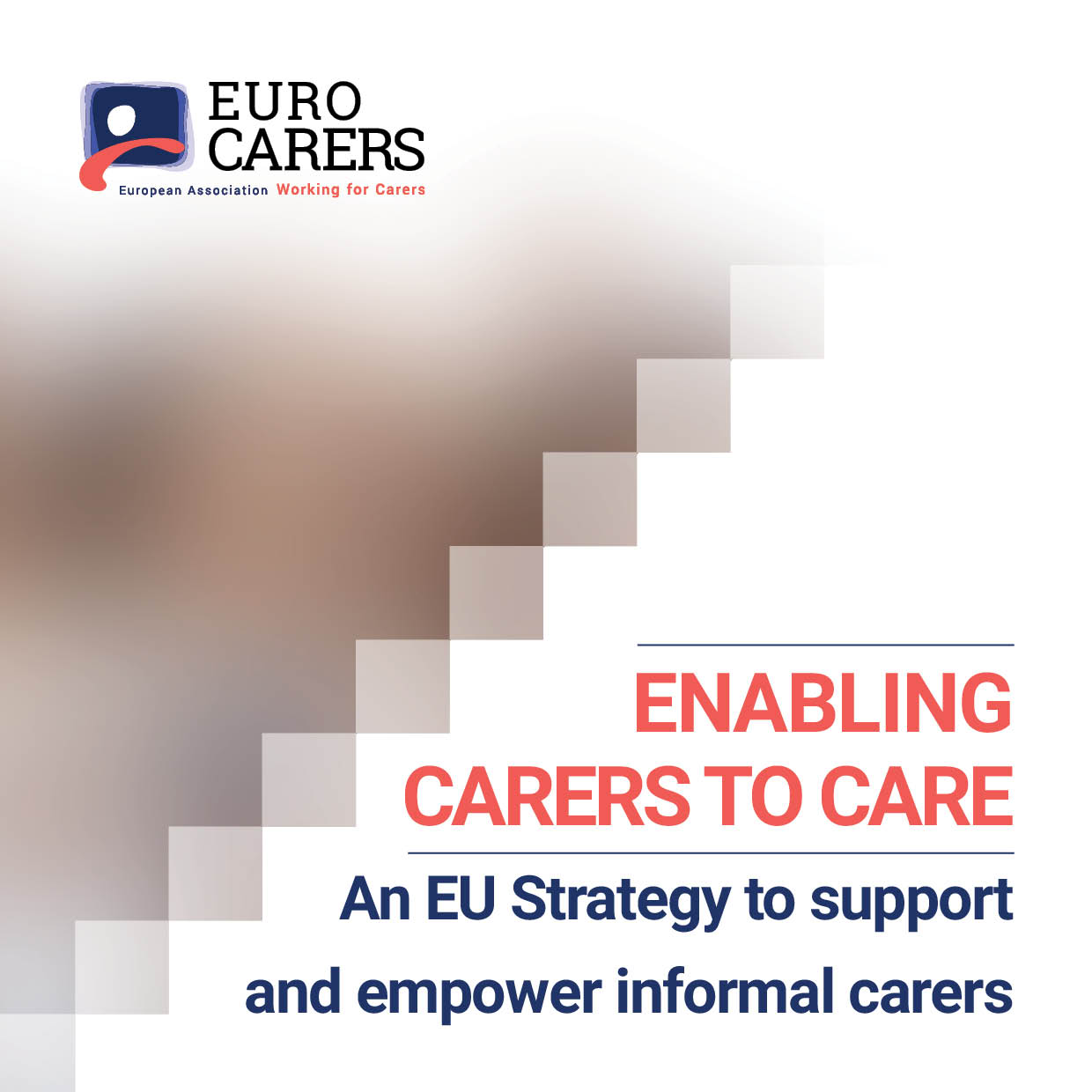Eurocarers defines a carer as:
a person who provides – usually – unpaid care to someone with a chronic illness, disability or other long lasting health or care need, outside a professional or formal framework.
Why are carers essential?
Europe’s overall increase in life expectancy and ageing demographic is generating a growing incidence of age-related conditions, a growing demand for care in all age groups and a serious sustainability challenge for care systems. This is exacerbated by an ageing EU health and social care workforce, problems with staff retention due to demanding working conditions and relatively low pay in some occupations, as well as the need for new skills and competences as a result of new care patterns and the rise in new technologies. These challenges are consistent across EU member states.
Against this backdrop, community care has become a prominent EU priority in the last few years and the shift towards home-based care is seen as a practical measure to contain the costs of services while also supporting widespread preferences among (older) people1. All of this puts more and more pressure on informal carers who – in most European countries – already provide a large part of Long-Term Care for dependent people.
In Europe, 80% of Long-Term Care (LTC) is provided by informal carers and estimates of the economic value of this unpaid care – as a percentage of the overall cost of formal Long-Term Care provision in the EU – ranges from 50 to 90 %. The projected budgetary impact of a progressive shift from informal to formal care by 2070 would imply an increase of the share of GDP devoted to Long-Term Care by 130% on average for the EU.
The value of informal care in Europe is not only a matter of finances. Informal care and solidarity also have an intrinsic value from a moral standpoint, i.e. standing and caring for vulnerable groups (e.g. people who are chronically ill, persons with disabilities and frail older people) not because of any personal interest, but because they need this support. Caring, and its impact on both those who carry out the role and those who receive care, engages civil, political as well as socio-economic rights. The provision of the latter in particular, requires positive actions by the State and investment of public resources.
From the above, it is clear that carers are an inherent as well as an indispensable part of the provision, organisation and sustainability of health and social care systems. They will become even more important in view of the changing health and care needs, due to demographic ageing and the increasing prevalence of frailty and chronic conditions.
What are the issues at stake?
Europe’s overall increase in life expectancy and ageing demographic generate a growing incidence of age-related diseases and demand for care. In Europe, 80% of all care is provided by informal carers – i.e. people who provide unpaid care to someone with a chronic illness, disability or other long-lasting health or care need, outside of a professional or formal framework. The contribution of these carers constitutes a great resource for our society but their role is not always recognised. Delivering a wide range of support services such as personal care, housekeeping, transportation, care and financial management as well as emotional support, carers often offer the most comprehensive and desirable option for people in need of care.
Caring for a loved one can be a source of great personal satisfaction but it does create its own set of challenges. These can include physical and mental health problems, a feeling of isolation, difficulty in balancing paid work with care responsibilities, perhaps even financial worries as social provisions are cut back. Advances in medicine also mean that carers find themselves having to deliver more and more sophisticated levels of care, with very little training and minimal support.
In Europe, 80% of all care is provided by informal carers
Number of carers and existing support measures across the EU
Country profiles
The country profiles below will provide a state of play on the country; demographic background, current Long-Term Care provision, carer-friendly policy environment, number of carers and their recognition and definition, access to information and respite care as well as information on the national and regional measures in place.
They are a compilation of the available information, if you are aware of more recent data, please feel free to get in touch with Eurocarers.
If you would like to know more about what is happening locally, feel free to contact the associations close to your place.
The Eurocarers strategy for a Carers-Friendly Europe
Demographic ageing in Europe gives rise to a growing incidence of age-related conditions, an increasing demand for care and a serious sustainability test for our social and health-care systems. According to research, informal Carers provide over 80% of all care in Europe, with women providing approximately two-thirds of care mainly as daughters (in law) and wives/partners. Estimates suggest that the economic value of unpaid informal care in the EU – as a percentage of the overall cost of formal Long-Term Care provision – ranges from 50 to 90 %. While it is clear that Carers will be essential to meet the challenges posed by ageing societies, free choice and personal autonomy should remain at the core of any initiative focusing on them.
This Strategy aims to define 10 core Steps identified by the Eurocarers network to implement a carer-friendly policy environment seeking to recognise, support and empower informal Carers across Europe in a comprehensive and coherent manner. It is designed to help policy makers (as well as all other stakeholders who can improve the lives of Carers, in partnership with them, and who can influence the support provided to Carers) acting at EU, national and regional level to consolidate existing but sometimes tokenistic approaches and to yield new evidence-informed initiatives in favour of Carers’ rights. The Steps listed in this document are closely interconnected and should therefore be approached as part of a whole.
They are in line with a vision of care which:
- Adopts individuals’, Carers’, families’ and communities’ perspectives as participants in, and beneficiaries of, trusted care systems organised around their needs and preferences;
- Respects people’s right to choose freely whether they want to be a carer, and to what extent they want to be involved in caring;
- Recognises and values Carers as equal partners in care;
- Supports and empowers Carers to manage their caring responsibilities with confidence and in good health and to have a life of their own outside of caring; and
- Seeks to prevent situation where Carers are disadvantaged, or discriminated against, by virtue of being a carer.
























